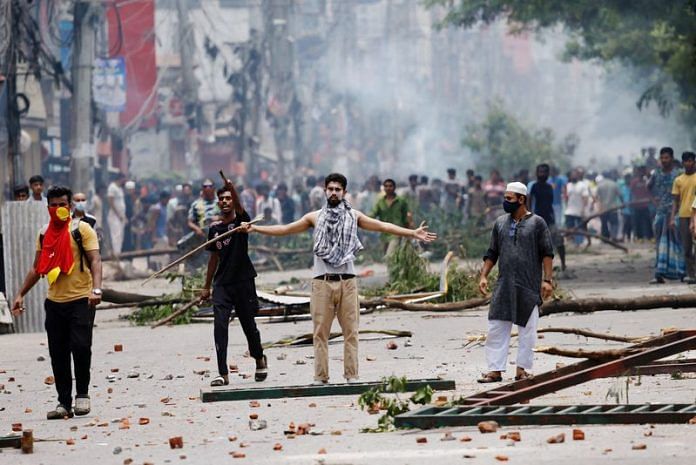By Sam Jahan and Sudipto Ganguly
DHAKA (Reuters) -Soldiers patrolled the deserted streets of the Bangladesh capital Dhaka on Saturday, setting up roadblocks during a curfew imposed in response to student-led protests against government job quotas that have killed at least 110 people this week.
Internet and text message services have been suspended since Thursday, cutting the nation off as police cracked down on protesters who defied a ban on public gatherings.
Overseas telephone calls mostly failed to connect while websites of Bangladesh-based media organisations did not update and their social media accounts remained inactive.
“To take a country of nearly 170 million people off the Internet is a drastic step, one we haven’t seen since the likes of the Egyptian revolution of 2011,” said John Heidemann, chief scientist of the networking and cybersecurity division at USC Viterbi’s Information Sciences Institute.
The internet shutdown meant many people could not top up their electricity meters, leaving them without power.
In addition to the deaths, the clashes have injured thousands, according to hospitals across Bangladesh. The Dhaka Medical College Hospital received 27 dead bodies between 5 p.m. and 7 p.m. (1100-1200 GMT) on Friday.
For five days police have fired tear gas, rubber bullets and hurled sound grenades to scatter protesters throwing bricks and setting fire to vehicles.
The demonstrations – the biggest since Prime Minister Sheikh Hasina was re-elected for a fourth successive term this year – have also been fuelled by high unemployment among young people, who make up nearly a fifth of the population.
With the death toll climbing and police and other security forces unable to contain the protests, Hasina’s government imposed a national curfew and deployed the military, who were given orders to shoot on sight if needed.
The curfew was eased for two hours from noon on Saturday to allow people to shop for supplies and complete other chores, television channels reported. It will last until 10 a.m. (0400 GMT) on Sunday, when the government will assess the situation and decide the next course of action, the reports added.
STONES AND DEBRIS
Those venturing out had their identification cards inspected by army personnel at check points. TV footage showed troops had set up roadblocks and bunkers using sandbags across strategic locations of Dhaka, the centre of the protests.
Reuters TV footage showed armed soldiers surveying roads littered with stones and debris as shops remained shuttered. Trees and barricades were uprooted on streets where charred vehicles stood. Young men played football on a deserted road during the relaxation in the curfew.
Nationwide unrest broke out over student anger against the quotas for government jobs, which included 30% reserved for the families of those who fought for independence from Pakistan.
Hasina’s government had scrapped the quota system in 2018, but a court reinstated it last month. The Supreme Court suspended the decision after a government appeal and will hear the case on Sunday after agreeing to bring forward a hearing previously scheduled for Aug. 7.
In the central Bangladesh district of Narsingdi, protesters stormed a jail on Friday, freeing over 850 inmates and setting fire to the facility, TV channels reported, citing police. Scattered incidents of arson were also reported on Saturday in some parts of the country.
Hasina dropped plans to leave on Sunday for diplomatic visits to Spain and Brazil due to the protests, the office of Foreign Minister Hasan Mahmud said.
Many opposition party leaders, activists and student protesters had been arrested, said Tarique Rahman, the exiled acting chairman of the main opposition Bangladesh Nationalist Party. Police arrested Nahid Islam, a leading student coordinator, at 2 a.m. on Saturday, the protesters said in a text message.
Reuters could not independently confirm the arrests.
Neighbouring India said nearly 1,000 Indian students had returned home since the violence began.
“The rising death toll is a shocking indictment of the absolute intolerance shown by the Bangladeshi authorities to protest and dissent,” said Babu Ram Pant, the deputy regional director for South Asia at Amnesty International, one of many rights groups that have criticised the government’s handling of the protests.
(Rporting by Sam Jahan in Dhaka and Sudipto Ganguly in Mumbai; Additional reporting by Mohammad Ponir Hossain in Dhaka; Writing by Sudipto Ganguly and Shilpa Jamkhandikar; Editing by Sam Holmes, William Mallard and Giles Elgood)
Disclaimer: This report is auto generated from the Reuters news service. ThePrint holds no responsibilty for its content.



